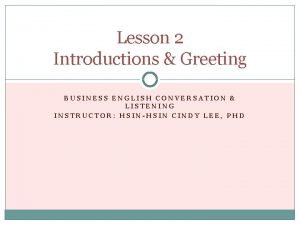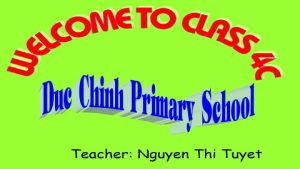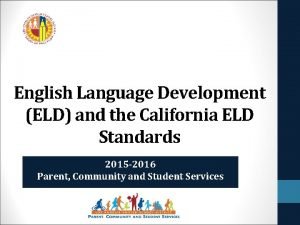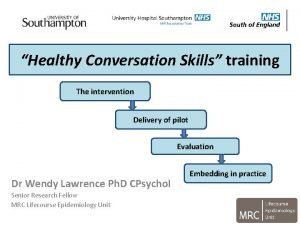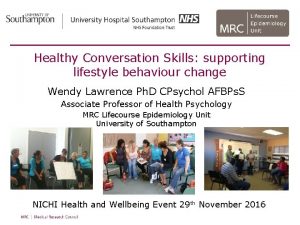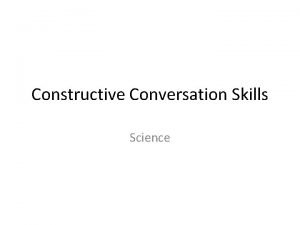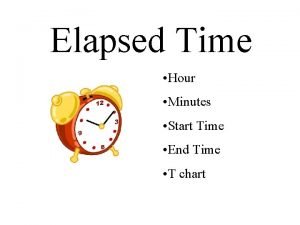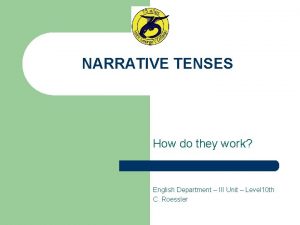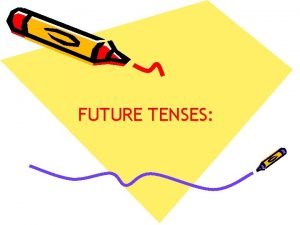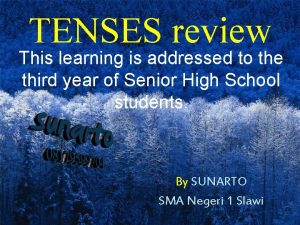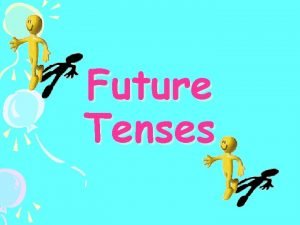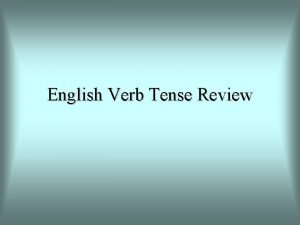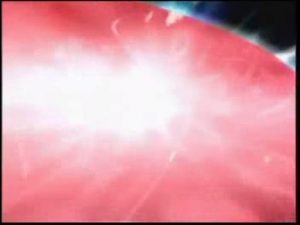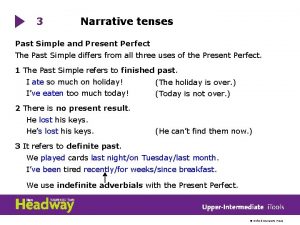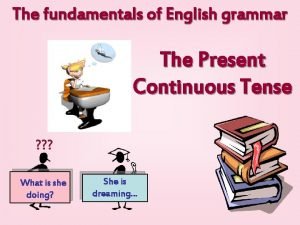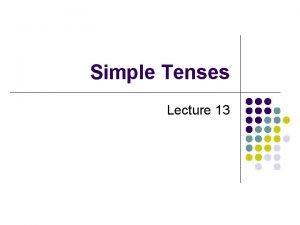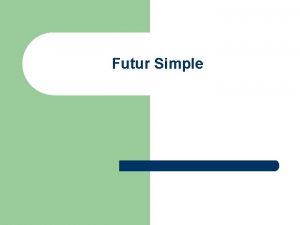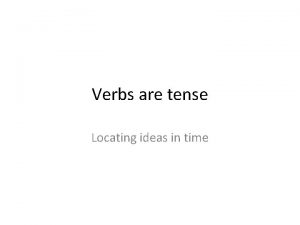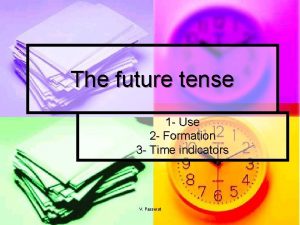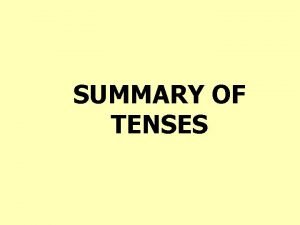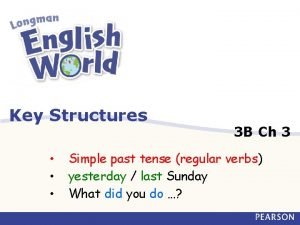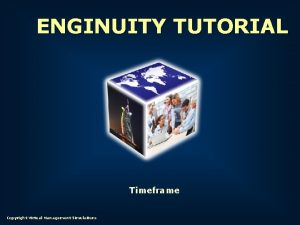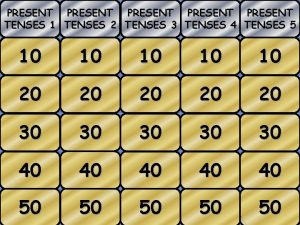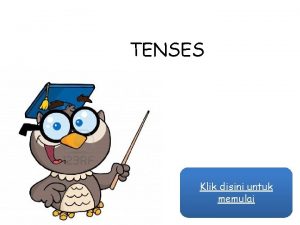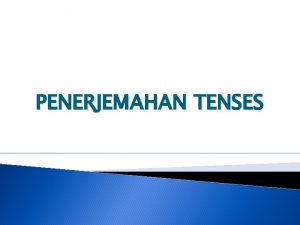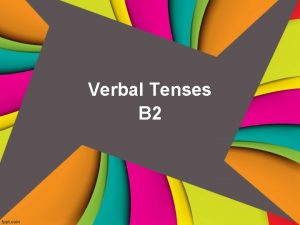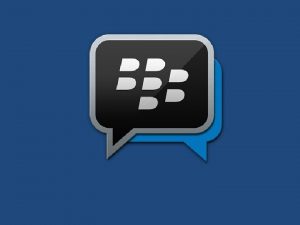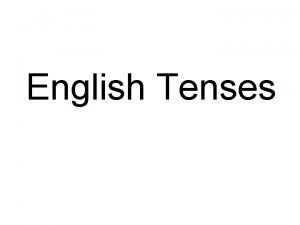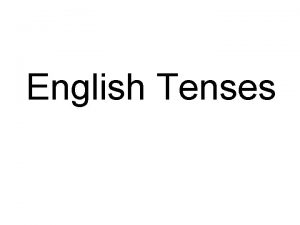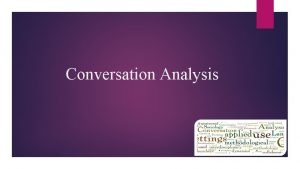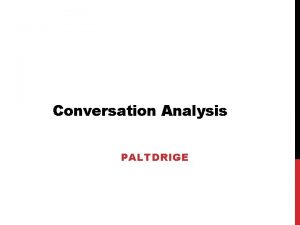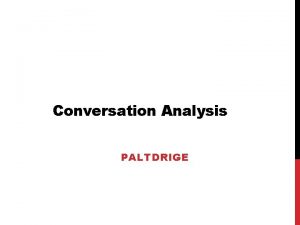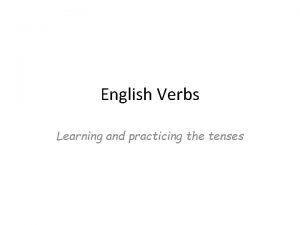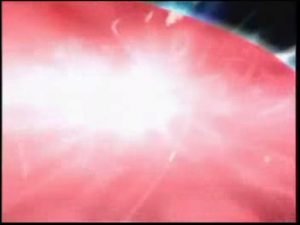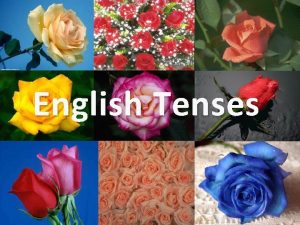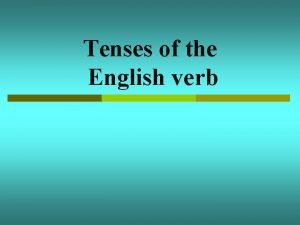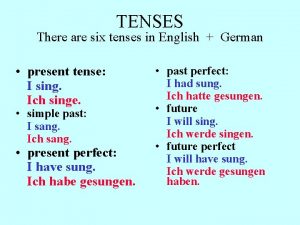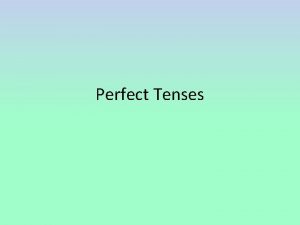English Conversation Skills TIMEFRAME TENSES AND TIME WORDS























- Slides: 23

English Conversation Skills TIMEFRAME, TENSES, AND TIME WORDS

Timeframe o When communicating, it is important to show the order of events, or when something happened o In English, the form of the word is different depending on the time frame • o Sometimes the same timeframe can be expressed in different ways • o o Example: I am going, I will go, I went I eat, I am eating, I have been eating = Present If you do not know the correct rule, make sure to include timeframe another way to avoid confusion • I am eating I eat now Now • I will eat I eat soon Future • I was eating I eat already Past However, if you do know the correct rule, make sure to use it

Tense o The correct way to use grammar in English to show the timeframe, or the order of events, is to use the correct TENSE of the word o The tense changes the form of the verb to indicate the time frame o There are many different tenses and each of them can be used to indicate the past, present, or future • It is not important to remember the names of the tenses, only the usage o This lesson will cover Simple, Continuous, and Perfect tenses o Each of these different tenses is used to indicate different situations • Simple refers to an entire event • Continuous refers to an event that is ongoing • Perfect tenses refer to an event from a different reference point

Overview

Tense Overview o Simple Tense: • o Use this tense when referring to an entire event Continuous/Progressive Tense: Events that occur over a time period • o Events that have a specific time Use this tense when you are referring to being in the middle of an ongoing event Perfect Tense: • An event that happened in the past compared to a reference point Use this tense when: • Referencing an event that has already occurred/has been occurring • Referencing an event that had already occurred/had been occurring • Referencing an event that will already have occurred/will have been occurring



Types of Tenses

Simple Tense o This tense is used for events that have a specific time • o This tense refers to the entire event • o o I played football for two hours Simple present is used for events that occur regularly or for stating facts • o I will play football tomorrow at 6 pm I always eat dinner at 7 pm, Wednesday I cook very well, I play football every Simple Past: add “ed” at the end of the word • Many words have a different form for simple past • Example: “I ate” is correct, “I eated” is incorrect Simple Future: add “will” in front of the word • I will eat, I will play, I will drive

Continuous/Progressive Tense o This tense is used for events that occur over a time period • o o This tense refers to an event that is ongoing • It is a tense that puts you in the middle of an event that is occurring • Example: I am playing football, I was cooking a meal, I will be flying Continuous Past: add “was” before the word and “ing” after • o I was eating, She was eating Continuous: add “am” or “is” before the word and “ing after • o I was playing football from 6 pm to 8 pm I am eating, She is eating Continuous Future: add “will be” before the word and “ing” after • I will be eating, She will be eating

Perfect Tenses o Perfect tenses refer to two points in time: 1. The point that the event occurred 2. The reference point o The reference point will be in the past, the present or the future o The event has always occurred before the reference point o Therefore, perfect tense is referring to an event from the perspective of a reference point o Example: By the time I finished the game, I had scored 20 points. o • 1. Event occurred: You scored 20 points • 2. Reference point in the past: When you finished the game Example: I have worked for 45 minutes already • 1. Event that occurred: Started working 45 minutes ago • 2. Reference point in the present: Now

Perfect Tense Diagram

Perfect Simple Tense o o Perfect Simple Present refers to an event in past from the present • She has finished her assignment already • Event that occurred: Finished her assignment • Reference point: Now The present form usually gets shortened to “I’ve” “You’ve” “She’s” • o o Example: She’s finished her assignment, I’ve never been to Italy Perfect Simple Past refers to a event in the past from the past • She had finished her assignment already when the teacher arrived • Event that occurred: Finished her assignment • Reference point: When the teacher arrived Perfect Simple Future refers an event from the future • She will have finished her assignment by the time the teacher gets here • Event that occurred: Finishing her assignment • Reference point: When the teacher will arrive

o Perfect Continuous/Progressive This tense is the same as the. Tense perfect simple except it refers to events that are or had been occurring at the time of the reference point o o Example: When I heard the news, I had been working for 2 hours. • Event that was occurring: Working • Reference point: When I heard the news Past: I had been working • o Present: I have been working • o I had been working for 2 hours already before I was able to start writing the paper I have been working since 7 am Future: I will have been working • When you get here, I will have been working for 16 hours

Examples

Simple Past vs Perfect Present o Examples o I played football vs. I have played football o o o • I played football yesterday Specific time • I have played football At some point in the past I worked vs. I have worked • I worked on the project yesterday Specific time • I have worked on this type of project before At some point in the past I ate vs. I have eaten • I ate some noodles before I came here • I have eaten horse, and I enjoyed it Specific time At any point in the past Did you play football? vs. Have you played football? • Did you play? Specific time • Have you played? At any point in the past

Perfect Past vs Perfect Present o Examples o I had played football vs. I have played football o • I had already played football when she arrived Before she arrived • I have played football Before now I had worked vs. I have worked • • o I had worked on the project for 2 hours already when my group members finally came Before group arrived I have worked on this type of project before Before now Had you played football? vs. Have you played football? • Had you played football yet? Before past event • Have you played? Before now

Simple Present vs. Continuous Present o Examples o I do my homework vs. I am doing my homework o o o • I usually do my homework in the afternoon Regular occurrence • I am doing my homework right now Currently I play football vs. I am playing football • She plays football Statement of fact • She can’t talk right now, she is playing football Currently I drive vs. I am driving • I drive a motorcycle Statement of fact • I am driving to work Currently Do you eat? vs. Are you eating? • Do you eat beef? Regular occurrence • Are you eating noodles? Currently

Time Words

Indicating a Time o There are correct ways and words to use to indicate a time o If you use the incorrect tense but you use the correct time words, you should still be able to communicate clearly o • Correct Grammar: I went to the store last Tuesday • Incorrect Grammar: I go to the store last Tuesday Using the correct tense is still very important to be able to communicate clearly • Incorrect Grammar: I go to the store on Tuesday • • Correct Grammar: • • Is it last Tuesday or next Tuesday? Is going to happen in the future Correct Grammar: • I am going to the store on Tuesday I went to the store on Tuesday Already happened in the past

Time Words o Ago: 2 days ago, 6 years ago, 2 minutes ago • o Just recently a while ago a long time ago • o o Ago means in the past A small amount, medium amount, and large amount of time in the past Last: Last Wednesday, last night, last week • The time before this, the Wednesday before now, the week before now • Do not use last day, use yesterday Next: Next Thursday, next year, next Christmas • Do not next afternoon, use tomorrow afternoon o Soon: A short time in the future o In a few: In a few weeks, in a few years, in a few minutes • “In a few” is in the future, “In just a few” is a short time in the future


 Congratulations dialogue
Congratulations dialogue Greeting and introduction conversation in english
Greeting and introduction conversation in english Cat and mouse story in english
Cat and mouse story in english Bridging emerging expanding
Bridging emerging expanding Healthy conversation skills
Healthy conversation skills Constructive conversation skills
Constructive conversation skills Healthy conversation skills
Healthy conversation skills Constructive conversation skills
Constructive conversation skills Example of elapsed time
Example of elapsed time Narrative tenses english
Narrative tenses english V present
V present Timetable future
Timetable future English tenses review
English tenses review Future tenses english
Future tenses english Present perfect tense indicators
Present perfect tense indicators Present tenses in english
Present tenses in english Past perfect continuous narrative tenses
Past perfect continuous narrative tenses What simple tenses are the fundamentals of english grammar
What simple tenses are the fundamentals of english grammar Lecture past tense
Lecture past tense English verb tenses timeline
English verb tenses timeline Six tenses of verbs
Six tenses of verbs Present perfect continuous indicators
Present perfect continuous indicators Future continuous and future perfect
Future continuous and future perfect Cry past tense
Cry past tense

